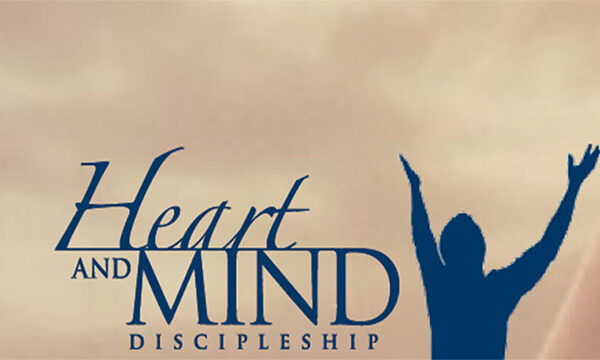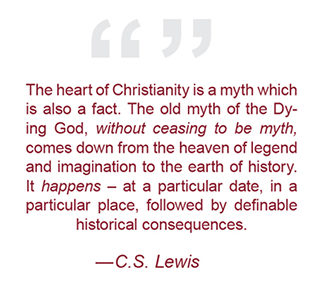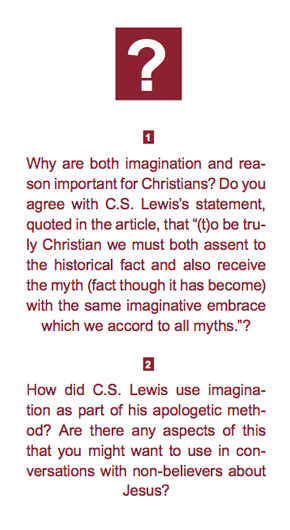Back to series



C.S. Lewis on Imagination and Reason in Christian Apologetics (Part 2 of 3)
(This is a three-part series on C.S. Lewis on Imagination and Reason in Christian Apologetics.
Part 1, Part 2, Part 3 )
Click here to open a Print - Friendly PDF
The Pagan Imagination
And as reason casts about, looking for things that are not only meaningful but identifiably true, it inevitably finds a great many stories presented for its consideration, some of which are much more true than others, and very few that are completely untrue. This point was important to Lewis because, as a boy, he had been told by his schoolmasters that Christianity was one hundred per cent correct and every other religion, including the pagan myths of ancient Greece and Rome, was one hundred per cent wrong. He found that this statement, rather than bolstering the Christian claim, undermined it and he abandoned his child faith ‘largely under the influence of classical education’.1
Having discovered through personal experience that the first thing necessary for Christian faith is an apprehension of Christianity’s meaningfulness, and not (not immediately, not primarily, in the order of explanation) its truth, Lewis was untroubled by the similarities between, for instance, the pagan Jupiter and the Hebrew Yahweh. The similarities ‘ought to be there’,2 it would be a problem if they were absent. And so he takes pleasure in pointing out, in Miracles, that ‘God is supposed to have had a “Son,” just as if God were a mythological deity like Jupiter.3 The resemblance needs to be present, given that God works through human myths as well as through His own true myth, the historical story of Jesus Christ. Since God is the Father of lights,4 even the flickering lights of paganism could be attributed ultimately to Him. Christians should feel no obligation to quench the smouldering wick burning in pagan myths: quite the reverse, they should do whatever they could to fan it into flame. Lewis, with Edmund Spenser, one of his greatest poetic heroes, believed that ‘Divine Wisdom spoke not only on the Mount of Olives, but also on Parnassus.5 Of course, the Parnassian wisdom was not as complete as that offered in Christ, it was not sufficient or salvific, but it should be admired and respected as far as it went.
By acknowledging the wisdom of Parnassus, Lewis was following the example of St Paul. In the Book of the Acts, Paul preaches to the men of Athens, using the pagan gods to communicate his message. He says to the Athenians that God ‘is not far from each one of us, for `In him we live and move and have our being’; as even some of your poets have said, `For we are indeed his offspring’ (Acts 17: 27-28).
 Paul gives two quotations there, but who is he quoting? Moses? Isaiah? One of the minor prophets? He is not quoting the Hebrew scriptures at all, but rather Greek poetry, poetry about the pagan gods, in particular the king of the pagan gods, Zeus. The first quotation comes from Epimenides, a Greek poet and philosopher of the sixth century before Christ. Epimenides wrote a poem in which he refers to Zeus as the god ‘in whom we live and move and have our being’. And the second quotation comes from Aratus, a poet from about 300 years before Christ, who again refers to Zeus, saying that ‘we are indeed his offspring’.
Paul gives two quotations there, but who is he quoting? Moses? Isaiah? One of the minor prophets? He is not quoting the Hebrew scriptures at all, but rather Greek poetry, poetry about the pagan gods, in particular the king of the pagan gods, Zeus. The first quotation comes from Epimenides, a Greek poet and philosopher of the sixth century before Christ. Epimenides wrote a poem in which he refers to Zeus as the god ‘in whom we live and move and have our being’. And the second quotation comes from Aratus, a poet from about 300 years before Christ, who again refers to Zeus, saying that ‘we are indeed his offspring’.
Paul’s example here is extremely interesting. Obviously he is not recommending that the men of Athens should worship Zeus: he is urging them to worship the true God, the Father of our Lord Jesus Christ. But notice how he goes about making this point. Rather than saying to the Athenians, ‘You’ve got it completely wrong’, he says, ‘You’ve got it partly right. You’re right that we live and move and have our being in God; you’re right that we are God’s offspring. You’re wrong in thinking that that God is Zeus, but you’re right in these other respects.’
In other words, Paul meets the men of Athens where they are, where they already have an inkling of meaning. He is not concerned to obliterate their traditions; he feels no need to denigrate their limited and incomplete religious knowledge. He works with it, corrects it, adds to it, sublimates it. He says, in rough paraphrase, ‘You have something here, but there’s a whole lot more, and that more is to be found in Jesus Christ.’ He takes what they already possess, imaginatively, and baptizes it. And apparently he had some success. When the Greeks heard Paul ‘some mocked; but others said, ‘We will hear you again about this.’ So Paul went out from among them. But some men joined him and believed, among them Dionysius the Areopagite and a woman named Damaris and others with them’ (Acts 17:32-33).
As an apologetic strategy, it only makes sense to meet people where they are. Where else, indeed, can they be met? Before people know the God and Father of the Lord Jesus Christ, they are not in a state of complete innocence or ignorance about the divine nature. Everyone after a certain age has thoughts and beliefs about what is of ultimate value in the universe, i.e. what is ‘divine’. Those thoughts need to be recognized and responded to. Sometimes the response will consist in contradiction, but more often than not there will be something that can be responded to positively, that can be coaxed into a fuller life and a brighter light. This is why Lewis can say, ‘the only possible basis for Christian apologetics is a proper respect for paganism’. Paganism must be ‘looked back at’ — respected — in order for the Christian apologist to see whether or how much it needs opposition.
Imagination is necessary
So, although apologetics is ‘a reasoned defense’, its basis is necessarily imaginative, for reason cannot work without imagination. The high value that Lewis accorded to imagination is seen in an essay called ‘Myth Became Fact’, where he writes:
I suspect that men have sometimes derived more spiritual sustenance from myths they did not believe than from the religion they professed. To be truly Christian we must both assent to the historical fact and also receive the myth (fact though it has become) with the same imaginative embrace which we accord to all myths. The one is hardly more necessary than the other.7
Of course, it is not possible, in fact, to separate ‘the one’ (the imaginative embrace) from ‘the other’ (the rational assent), but it is occasionally worth doing a thought experiment on oneself to discover which of them one would prefer if (per impossible) one were forced at the point of a gun to choose between them. There is little doubt which Lewis would have inclined towards. He writes, “A man who disbelieved the Christian story as fact but continually fed on it as myth would, perhaps, be more spiritually alive than one who assented and did not think much about it.”8
Given that an imaginative embrace of Christianity is as necessary a response as rational assent, and given that rational assent cannot be given without imaginative content informing it, the only issue that the apologist has to settle is whether he is going to conduct his ‘reasoned defence’ in terms which are more imaginative or less imaginative. They are going to be imaginative at some level whether he likes it or not. The question to be answered is: to what extent will they approximate the lived language of the Christ story and to what extent will they render that language in more abstract categories?

Abstract categories have the value of clarity, but in other respects are less desirable, Lewis thinks. The less imaginative the terms in which an apologist couches his argument, the less they can actually communicate the thing under discussion. In a brilliant, though sadly incomplete, article entitled ‘The Language of Religion’, Lewis homed in on this problem:
Apologetics is controversy. You cannot conduct a controversy in those poetical expressions which alone convey the concrete: you must use terms as definable and univocal as possible, and these are always abstract. And this means that the thing we are really talking about can never appear in the discussion at all. We have to try to prove that God is in circumstances where we are denied every means of conveying who God is.9
We have already observed how Lewis discovered, in the course of his own path to faith, that doctrinal language is less adequate to the reality of Christian truth than the lived language of the Christ story itself. As an apologist, he further discovered that controversial language (the language of debate, persuasion, demonstration) was even less adequate than doctrinal language  because, in a controversy, one has to thin down one’s language so that one can communicate with one’s opponents who, by definition, do not posssess the imaginative embrace of the topic in hand necessary to a full appreciation of what one is saying.
because, in a controversy, one has to thin down one’s language so that one can communicate with one’s opponents who, by definition, do not posssess the imaginative embrace of the topic in hand necessary to a full appreciation of what one is saying.
The apologist has to work, so to speak, at the university lecture podium or at the bar of the court-room, all the while talking about something which goes on, in reality, at neither place, but rather in prayer, Communion, confession, the reading of the scriptures, – in the holistic life of faith. Apologetic language unavoidably uses ‘the logic of speculative thought’ instead of the more pertinent ‘logic of personal relations’10; it has to be univocal so that it is useful in contexts where Christianity does not, of its own nature, normally reside. The situation is akin to Mozart or Beethoven trying to prove their musicality not by conducting one of their symphonies in front of an orchestra but by standing gagged at a maths blackboard using only numbers.
This is what Lewis means when he talks about ‘the great disadvantages under which the Christian apologist labours’11. The life of faith is best communicated in its own terms, namely ‘life’: the lived language of real human beings in real times in real places. Actions speak louder than words. If faith has to be turned into apologetic words, it is best to use words that tell a story, as in the Synoptic Gospels, or words that both tell a story and are richly resonant and connotative, like the mighty nouns of St John’s Gospel (‘Word’, ‘Light’, ‘Life’, ‘Way’, ‘Water’, ‘Glory’, ‘Vine’, ‘Bread’). Such narrative or symbolic terms are more capacious than the attenutated metaphors characteristic of abstract arguments; they are therefore more able to contain the huge wealth of meaning that there is to carry.
Aware of the ‘disadvantages’ of abstraction, Lewis did not limit himself to the ‘reasoned defences’ of traditional apologetics. He also attempted more poetic and creative presentations of the faith in his fiction. His most notable attempt was, of course, the seven Chronicles of Narnia, and these stories have achieved more, perhaps, than any of his writings, by way of communicating the heart of his faith. Rowan Williams has said of the Narnia septet that ‘more theological students ought to read it for a sense of what classical orthodox theology feels like from the inside, – a unique achievement at that level’.12 Chad Walsh, author of the first study of C.S. Lewis, Apostle to the Skeptics, is of the opinion that ‘In these books where his imagination has full scope [Lewis] presents the Christian faith in a more eloquent and probing way than ever his more straightforward books of apologetics could.13

But this present essay is about apologetics in the sense of ‘reasoned defence’, where language cannot be as rich and redolent, and therefore true to life, as in a fairy-tale. In non-fiction apologetics, language has to be univocal or, at any rate, ‘as univocal as possible’. Lewis did not think it was possible to be utterly univocal, even in his ‘reasoned defences’, for he believed that all language, except for the most basic and elementary, was metaphorical, and even the highly desiccated metaphors are not verbal algebra.14 So, he makes a virtue of necessity and, if one compares his Mere Christianity against other broad introductory apologetic works such as John Stott’s Basic Christianity, N.T. Wright’s Simply Christian, or Timothy Keller’s The Reason for God, one notices how much Lewis’s book stands out for the wealth of imagery it employs.
He constantly resorts to analogy, simile and metaphor in a way and to an extent which none of these three successor books does. His ‘flotilla’ metaphor has always struck me as especially helpful15; likewise the image of the statues in the sculptor’s shop.16 Other images, such as the Whitesmile’s toothpaste that remains unused ‘by a healthy young negro’17, are now well past their use-by date; the famous ‘poached egg’18 simile is also perhaps too colourful for its own good. But Lewis’s working principle is sound, whatever the particular faults one may identify in his practice: apologetic language benefits from being vivid, sensory, and chosen with poetic, not just abstractly rational, intent.
Lewis aims, then, to lead his readers along the road he himself trod. Apprehension of meaningfulness was, as we have seen, the first step in his conversion and so it became, in due course, the customary first step in his apologetic method. If one looks at the rhetorical strategies informing Lewis’s apologetics, one almost always finds that he begins, in the very first paragraph, by immersing the reader in a meaningful situation, whether it be quarrelling (as in Mere Christianity), despairing (as in The Problem of Pain), or doubting (as in Miracles). When, in The Four Loves, he introduces the first of the loves, storge, he aims first of all to establish ‘the meaning of the word’:
The image we must start with is that of a mother nursing a baby, a bitch or a cat with a basketful of puppies or kittens; all in a squeaking, nuzzling heap together; purrings, lickings, baby-talk, milk, warmth, the smell of young life.
 The method is poetic, rather than polemic. There is no question, at the outset, of whether these various images or situations are good or bad, true or false, beautiful or ugly. They just are: rational judgements about their value can wait. We know that they mean something and they resonate with our experience or our observations of the world. Having thus engaged our imaginations, Lewis then proceeds to his next step. But as he proceeds he does not leave imagination behind and exit into some purely ‘rational’ realm. His strategy is imaginative all the way along: it has to be, given his understanding of how reason works. There is no question of discarding imagination and emerging into a neutral, reliable, ‘scientific’, disinterested region which must perforce command the assent of all objective observers. Lewis is not willing to reduce himself or his readers to mere ‘thinkers’ in a sort of ultra-Cartesian move which plagues so much inferior apologetics and so many earnest undergraduate late-night discussions. It is no good arguing for ‘God’ or ‘Christ’ or for ‘the atonement’ or even for ‘truth’ until the apologist has shown, at least at some basic level, that these terms have real meaning. Otherwise they will be just counters in an intellectual game, leaving most readers cold.
The method is poetic, rather than polemic. There is no question, at the outset, of whether these various images or situations are good or bad, true or false, beautiful or ugly. They just are: rational judgements about their value can wait. We know that they mean something and they resonate with our experience or our observations of the world. Having thus engaged our imaginations, Lewis then proceeds to his next step. But as he proceeds he does not leave imagination behind and exit into some purely ‘rational’ realm. His strategy is imaginative all the way along: it has to be, given his understanding of how reason works. There is no question of discarding imagination and emerging into a neutral, reliable, ‘scientific’, disinterested region which must perforce command the assent of all objective observers. Lewis is not willing to reduce himself or his readers to mere ‘thinkers’ in a sort of ultra-Cartesian move which plagues so much inferior apologetics and so many earnest undergraduate late-night discussions. It is no good arguing for ‘God’ or ‘Christ’ or for ‘the atonement’ or even for ‘truth’ until the apologist has shown, at least at some basic level, that these terms have real meaning. Otherwise they will be just counters in an intellectual game, leaving most readers cold.
Likewise, apologetic arguments for the authority of ‘the Church’ or ‘the Bible’ or ‘experience’ or ‘reason’ itself, must all be imaginatively realized before they can begin to make traction on the reader’s reason, let alone on the reader’s will. Before we act or think we understand meaning, in Lewis’s view, and so the provision of meaningful images becomes the hallmark of his apologetic method.
But although Lewis accords imagination a high place, it is not the only or the highest place. There is also reason and reason is important — indeed, essential, — if imagination is to serve its proper purpose.
Article taken from Imaginative Apologetics: Theology, Philosophy and the Catholic Tradition, edited by Andrew Davison. Published by SCM Press, 2011.
Notes:
1 Letter to the Revd Henry Welbon, 18 September 1936 (unpublished, but available in the Wade Center, Wheaton College, IL).
2 ‘Myth Became Fact’, C.S. Lewis, Essay Collection, 142.
3 Miracles, A Preliminary Study (Glasgow: Collins 1980) 72.
4 ‘I do believe that God is the Father of lights - natural lights as well as spiritual lights (James 1:17)’. Interview with the Billy Graham Evangelistic Association, reprinted as ‘Cross-Examination’, C.S. Lewis, Essay Collection, 555. Cf. Lewis’s assessment of Richard Hooker, perhaps his favourite theologian, who thought that ‘all kinds of knowledge, all good arts, sciences, and disciplines come from the Father of lights and are ‘as so many sparkles resembling the bright fountain from which they rise’’, English Literature in the Sixteenth Century, Excluding Drama (Oxford: Clarendon, 1954) 460.
5 Spenser’s Images of Life, ed. Alastair Fowler (Cambridge: Cambridge University Press, 1967) 14.
6 Letter to the Revd Henry Welbon, 18 September 1936 (unpublished).
7 ‘Myth Became Fact’, C.S. Lewis, Essay Collection, 141.
8 ‘Myth Became Fact’, C.S. Lewis, Essay Collection, 141.
9 ‘The Language of Religion’, C.S. Lewis, Essay Collection, 261.
10 ‘On Obstinacy in Belief’, C.S. Lewis, Essay Collection, 215.
11 ‘The Language of Religion’, C.S. Lewis, Essay Collection, 261.
12 Rowan Williams, ‘A Theologian in Narnia’, address to the Oxford Lewis Society, 9 November 1999; speaker’s own notes (copy in this author’s possession).
13 Chad Walsh, ‘Impact in America’ in Gibb, Jocelyn (ed.) Light on C.S. Lewis (London: Geoffrey Bles, 1965) 116.
14 ‘When we pass beyond pointing to individual sensible objects, when we begin to think of causes, relations, of mental states or acts, we become incurably metaphorical. We apprehend none of these things except through metaphor’, ‘Bluspels and Flalansferes’, Selected Literary Essays, 263.
15 Mere Christianity (Glasgow: Collins, 1990) 67-70.
16 Mere Christianity 135-136.
17 Mere Christianity 175.
18 Mere Christianity 52.
19 The Four Loves 33.

Michael Ward
ProfessorMichael Ward is a member of the Faculty of Theology and Religion at the University of Oxford and Professor of Apologetics at Houston Baptist University. He studied English at the University of Oxford, theology at the University of Cambridge, and he earned his PhD in Divinity at the University of St. Andrews. He is the author and editor of multiple books, most notably the award-winning Planet Narnia: The Seven Heavens in the Imagination of C.S. Lewis, After Humanity: A Guide to C.S. Lewis’s The Abolition of Man and The Cambridge Companion to C.S. Lewis. On the fiftieth anniversary of Lewis’s death, Dr. Ward unveiled a permanent national memorial to Lewis in Poets’ Corner, Westminster Abbey, London.

Recommended Reading:
The Romantic Rationalist: God, Life and Imagination in the Work of C.S. Lewis, edited by John Piper and David Mathis (Crossway, 2014)
C. S. Lewis stands as one of the most influential Christians of the twentieth century. His commitment to the life of the mind and the life of the heart is evident in classics like the Chronicles of Narnia and Mere Christianity — books that illustrate the unbreakable connection between rigorous thought and deep affection. With contributions from Randy Alcorn, John Piper, Philip Ryken, Kevin Vanhoozer, David Mathis, and Douglas Wilson, this volume explores the man, his work, and his legacy — reveling in the truth at the heart of Lewis’s spiritual genius: God alone is the answer to our deepest longings and the source of our unending joy.
 COPYRIGHT: This publication is published by C.S. Lewis Institute; 8001 Braddock Road, Suite 301; Springfield, VA 22151. Portions of the publication may be reproduced for noncommercial, local church or ministry use without prior permission. Electronic copies of the PDF files may be duplicated and transmitted via e-mail for personal and church use. Articles may not be modified without prior written permission of the Institute. For questions, contact the Institute: 703.914.5602 or email us.
COPYRIGHT: This publication is published by C.S. Lewis Institute; 8001 Braddock Road, Suite 301; Springfield, VA 22151. Portions of the publication may be reproduced for noncommercial, local church or ministry use without prior permission. Electronic copies of the PDF files may be duplicated and transmitted via e-mail for personal and church use. Articles may not be modified without prior written permission of the Institute. For questions, contact the Institute: 703.914.5602 or email us.
-
Recent Podcasts
Questions That Matter – Pippa Cramer and The Hymns We Love
by Pippa Cramer, Randy Newman on February 21, 2025Many people grew up singing Christian hymns. Pippa...Read More
-
Conversational Apologetics
by Michael Ramsden, Aimee Riegert on February 21, 2025
-
Questions That Matter – Heather and Ashley Holleman and the Greatness of Conversation
by Randy Newman, Heather Holleman on February 14, 2025
-
Recent Publications
The Impact of Technology on the Christian Life
by Tony Reinke on February 14, 2025"It’s applied technique. So it’s an art. It’s...Read More
-
C.S. Lewis and the Crisis of the Modern Self
by Thiago M. Silva on February 1, 2025
-
Why Are Christians So Hypocritical?
by William L. Kynes on January 1, 2025
0
All Booked
0.00
All Booked
0.00
All Booked
23993
Heart and Mind Discipleship Live Online Small Group 8:00 PM ET
https://www.cslewisinstitute.org/?event=heart-and-mind-discipleship-live-online-small-group-800-pm-et&event_date=2025-02-25®=1
https://www.paypal.com/cgi-bin/webscr
2025-02-25

Next coming event
Days
Hours
Minutes
Seconds
Heart and Mind Discipleship Live Online Small Group 8:00 PM ET
On February 25, 2025 at 8:00 pmCategories
Speakers

Michael Ward
Professor
Team Members

Michael Ward
ProfessorMichael Ward is a member of the Faculty of Theology and Religion at the University of Oxford and Professor of Apologetics at Houston Baptist University. He studied English at the University of Oxford, theology at the University of Cambridge, and he earned his PhD in Divinity at the University of St. Andrews. He is the author and editor of multiple books, most notably the award-winning Planet Narnia: The Seven Heavens in the Imagination of C.S. Lewis, After Humanity: A Guide to C.S. Lewis’s The Abolition of Man and The Cambridge Companion to C.S. Lewis. On the fiftieth anniversary of Lewis’s death, Dr. Ward unveiled a permanent national memorial to Lewis in Poets’ Corner, Westminster Abbey, London.





